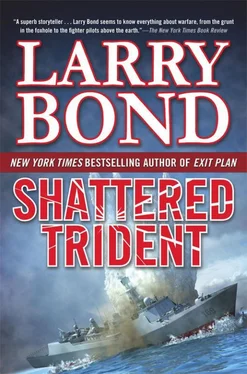The vague allusion to Jerry’s past prompted Kane to ask, “Sir, I’ve heard the rumors about the skipper, just like everyone else. Did he really fight his way out of Iran?”
Thigpen suppressed the desire to groan. How many times had he been asked that question? And why did everybody think he knew the answer? Sighing, he replied, “Jacques, I honestly don’t know for sure. The skipper has never said a word to me. But you can take this to the bank; you don’t get a Navy Cross and a Purple Heart from the president of the United States for just being a damn good executive officer—however wonderfully you performed your duties. No, our skipper did something very unusual and very important to merit those awards.”
He neglected to mention the circular scar he’d seen on Jerry’s left shoulder after he had showered. In such close quarters, where even the two seniormost officers shared a common head, it was nearly impossible to hide something so obvious, and yet so personal.
“He looked really depressed,” empathized Kane. “Will he be all right?”
“He’ll be fine,” insisted Thigpen confidently. “A little flame-spraying every now and then is good for the soul, builds character. He’s a big boy. He’ll get over it.” Left unspoken were the words, “I hope.”
Squadron Fifteen Headquarters
Guam
Commander Walker stood by the information systems technician as he logged out of the VTC system and turned off the video camera and large flat-panel display. The young man then quickly departed, leaving Walker alone with the commodore. The chief staff officer and the rest of the staff had also vacated the conference room within moments of the VTC ending. Walker completely understood why the others wanted to clear datum; Simonis was still fuming. Wonderful. His commodore was going to be very cranky for the rest of the day.
“You don’t approve,” Simonis spurted without warning.
Walker wasn’t sure if it was a statement or a question, but either way it was a loaded comment. One that he had to tread carefully around. “Excuse me, sir,” he said.
“My handling of Mitchell. I can read body language fairly well, Commander. I take it most of my staff thought I was being too harsh on our new captain.”
“Commodore, it isn’t my place to say one way or the other. This is your command…”
“Damn it, Rich! Stop dancing and tell me what you think!” roared Simonis.
Trapped, Walker gestured toward a chair. Simonis nodded, and the operations officer tossed his notebook onto the table as he sat down.
“Well?” Simonis demanded impatiently.
“In a nutshell, yes, sir. I think you were a bit hard.”
“Why?”
Walker took a deep breath; he had to carefully phrase his words. Simonis wasn’t a bad commodore; on the contrary, he was quite successful. He ran a tight squadron at the end of a long logistics train and kept things moving on track, on schedule. No, a better description of Simonis would be that he was tough and demanding. He wanted everything done at the right time, the right way, for the right reason. Deviating from the approved plan was not advisable or tolerated. His rigid, almost legalistic interpretation of rules and regulations always brought him into conflict with those individuals who regarded official edicts as being somewhat elastic, having a little give, depending on the situation.
“Commodore, while he may have not followed the exact letter of the law in regard to his orders, he did follow its spirit. What Mitchell did was well thought out and perfectly executed. And I agree it’s likely neither the Vietnamese nor the Chinese will conclude that a U.S. submarine broke up the attack.”
“But he revealed himself when he dropped that NAE!” Simonis insisted angrily.
“Sir, you’re implicitly assuming that revelation automatically becomes useful, incriminating knowledge. In this case, I think that’s a bit of a stretch.”
Simonis stood up abruptly and started pacing. Everything about Jerry Mitchell seemed to annoy him, grated his sensibilities. “I still believe he overstepped his bounds,” he grumbled.
“Yes, sir, he did. But he had his orders in mind when he dropped an antiquated NAE instead of a more modern countermeasure. If I may, Commodore, it appears to me that you’re more upset that Mitchell decided to interfere with the attack in the first place, not necessarily with how he went about doing it,” observed Walker.
The commodore paused, considering Walker’s last statement. His operations officer was right. He was irritated that Mitchell had become actively involved when their orders had directed them to be passive observers. And while the orders hadn’t explicitly restricted them to that role solely, there was a strong inference to that effect. Simonis inwardly cursed the sloppiness with which the whole operation had been thrown together. Rushed, ill-conceived, a typical Washington solution to a dangerous situation. It was a response that allowed the powers that be to say during an election year campaign that something had been done, while at the same time limiting the United States’ involvement. A response that made little sense from a military perspective, and put his entire squadron potentially in harm’s way.
“Point taken, Rich,” Simonis granted. “Well, I hope the additional instructions I provided Commander Mitchell will preclude any further shenanigans.”
Walker noted the reduced volume in his boss’s voice, but there was still something in the background. “Hope, sir? You sound uncertain. Mitchell didn’t strike me as a man who is openly insubordinate or reckless. In fact, everything I’ve heard says he’s an outstanding officer.”
Simonis shook his head as he plopped back into his seat. “Same here. I’ve even spoken to Rear Admiral Guthrie, and he was effusive with his praise. He said Mitchell was intelligent, innovative, calculating, thorough, and responsible. Everything I would have wanted to hear about a new skipper assigned to my command.”
Walker was now puzzled. He’d thought the problem had been identified and dealt with, but now he wasn’t so sure. Something else was gnawing at his commodore, something other than Mitchell’s novel tactics. North Dakota ’s CO was certainly at the heart of the matter, but he wasn’t the only factor. There was something else, thus far unspoken.
“I’m sorry, sir. I guess I’m not following you. What is it that has you concerned?” asked Walker with a hint of frustration.
Simonis grinned warily, surprising Walker. “Washington,” said the commodore bluntly.
“Washington? I don’t get it.”
“This operation is a Washington-inspired idea, and Mitchell is their local man on the scene. I’m not sure they’ll take my disciplining of their fair-haired boy very well.”
Walker struggled to hide his skepticism. He was well aware of Simonis’s aversion to Washington politics, but this was a bit much. How would they even know, unless…
“Sir, you’re not suggesting Mitchell would contact them directly? Bypassing the entire chain of command?” exclaimed Walker, aghast.
“Of course not!” Simonis snapped back. “But I have to report this up my chain of command, and Admiral Burroughs will pass it on to PACOM, who will pass it on to the CNO, et cetera, et cetera, until it eventually gets to Patterson.”
“The deputy national security advisor?”
“Correct!”
“Begging your pardon, sir. But why would Dr. Patterson even bother to get involved over such a minor issue? I know she and Mitchell are friends, but she has a lot more important things on her plate right now,” countered Walker.
“Because, Commander, she has a proven track record of getting her mitts into other people’s business. She and Mitchell are very close, and she has inserted herself into the picture every time he’s gotten into trouble.” Simonis sprang back to his feet and started pacing again.
Читать дальше

![Никки Сикс - Героиновые дневники. Год из жизни павшей рок-звезды[The Heroin Diaries - A Year in the Life of a Shattered Rock Star]](/books/78612/nikki-siks-geroinovye-dnevniki-god-iz-zhizni-pavshej-rok-zvezdy-the-heroin-diaries-a-yea-thumb.webp)










